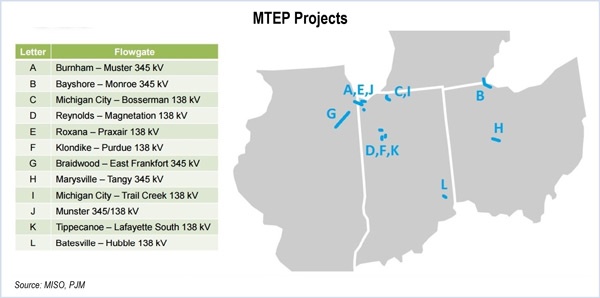By Amanda Durish Cook
CARMEL, Ind. — FERC on Monday approved a proposal by PJM and MISO to create a new category of small interregional transmission projects while cautioning that the measure could see future revisions.
The proposal updates the PJM-MISO joint operating agreement with a targeted market efficiency project (TMEP) type, which applies to projects that reduce historical congestion along the RTOs’ seams.
Still, in its June 26 delegated order, FERC staff said that preliminary analysis indicates the proposal has “not been shown to be just or reasonable” and left open to the possibility that it could be subject to refund after being implemented (ER17-721). The RTOs are eligible to use the project type starting June 28.
The RTOs filed jointly last year to create TMEPs to encourage construction of cost-effective and congestion-relieving seams projects that might otherwise be overlooked because of their low cost and small size. Their proposal stipulates that TMEPs cost less than $20 million, be in service within three years of approval, and within four years of operation provide congestion relief equal to or greater than the cost of construction. Costs will be apportioned to MISO and PJM based on the percentage of congestion relief benefits accruing to each RTO.
The RTOs have so far identified $17.25 million worth of upgrades in five TMEP candidate projects, and expect those projects to deliver a 5.8:1 benefit-cost-ratio and realize $100 million in benefits within four years of going in service. (See MISO-PJM TMEP Projects Drop to Five.) Both RTOs hope to finish evaluation of TMEP candidates by September and seek respective board approvals by the end of the year.
Exelon, the Organization of MISO States, Northern Indiana Public Service Co., the Indiana Utility Regulatory Commission and ITC Mid Atlantic Development supported the proposal in comments to FERC. MISO South regulators protested the filing, claiming that the RTOs’ benefits analysis fails to take congestion hedging revenues into consideration.
Speaking on behalf of the MISO Transmission Owners sector, Ameren Senior Director of Transmission Policy Dennis Kramer said that the factoring in of congestion hedging revenues would “complicate” the TMEP study process.
“Excluding the congestion hedge costs is consistent with the TMEP goal of straightforward, efficient metrics that can be easily reproduced by stakeholders,” Kramer said in comments submitted for a June 13 FERC workshop on the TMEP issue. “Adding congestion hedges … would fundamentally change the nature of the TMEPs by changing the study from a simple analysis of historical flowgate congestion to a multifaceted deconstruction of a series of complex financial hedging instruments which differ in each RTO. Such action would counteract the RTOs’ ability to implement the quick-hit, high-value project types.”
Regional Cost Allocation
FERC must still also act on separate proposals by MISO and PJM regarding how they plan to allocate their portion of TMEP costs regionally.
MISO plans to pursue a bifurcated cost allocation, using a local transmission pricing zone when the constraint exists on lines belonging to one or more MISO transmission owners. For constraints wholly within PJM, MISO is seeking a postage stamp allocation for the entire MISO Midwest region.
However, MISO missed its targeted April filing deadline to complete a regional cost allocation because it needed more time to develop the process with stakeholders. Spokesman Mark Adrian Brown said the RTO will submit an allocation proposal “as soon as possible.”
PJM in April filed a regional cost allocation proposal that would assign TMEP costs to zones and merchant transmission facilities “that are shown to have experienced net positive congestion over the two historical years prior to the TMEP study period” (ER17-1406).





